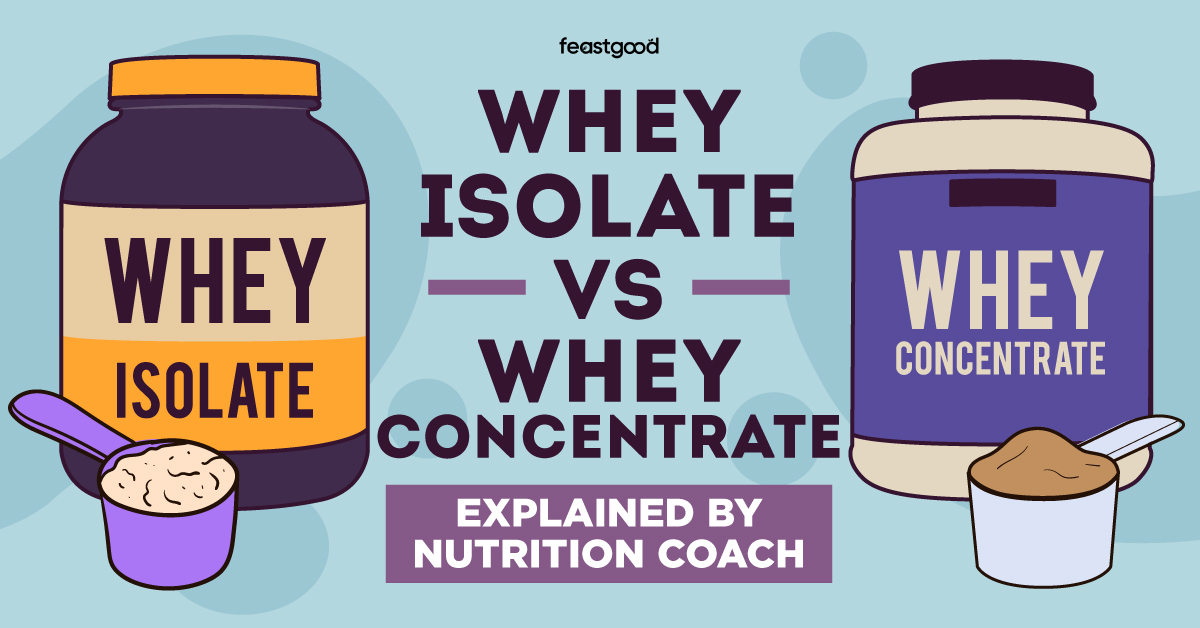Some links in this article are affiliate links, which means we earn from qualifying purchases. Learn more.
When buying a protein powder, you may notice that protein powders made with whey protein concentrate are much cheaper than whey isolate. The price difference may make you question the quality of the whey concentrate compared to that of the whey isolate.
Is whey concentrate a cost-effective alternative to whey isolate, and which should you choose based on your goals? I’ll give you my perspective as a Nutrition Coach.
Key Takeaways
- Whey isolates and whey concentrate protein powder both come from dairy milk, but whey isolate is more refined and will have 90% or more protein per serving, whereas whey concentrate will only have 60-80% protein with more carbs and fat per serving.
- If you’re struggling to hit your protein intake, whey isolate is your best option. It also absorbs faster, which is ideal for post-workout (if all other aspects of your nutrition are on point). It’s also a better option if you’re looking for a lactose-free protein supplement.
- Whey concentrate will have higher satiety than whey isolate, making it better for those who want to “feel full” from their protein shake. It’s also a better option if you plan to cook with protein powder, such as using it in protein pancakes, cookies, or oatmeal.
What Is Whey Isolate Protein Powder?
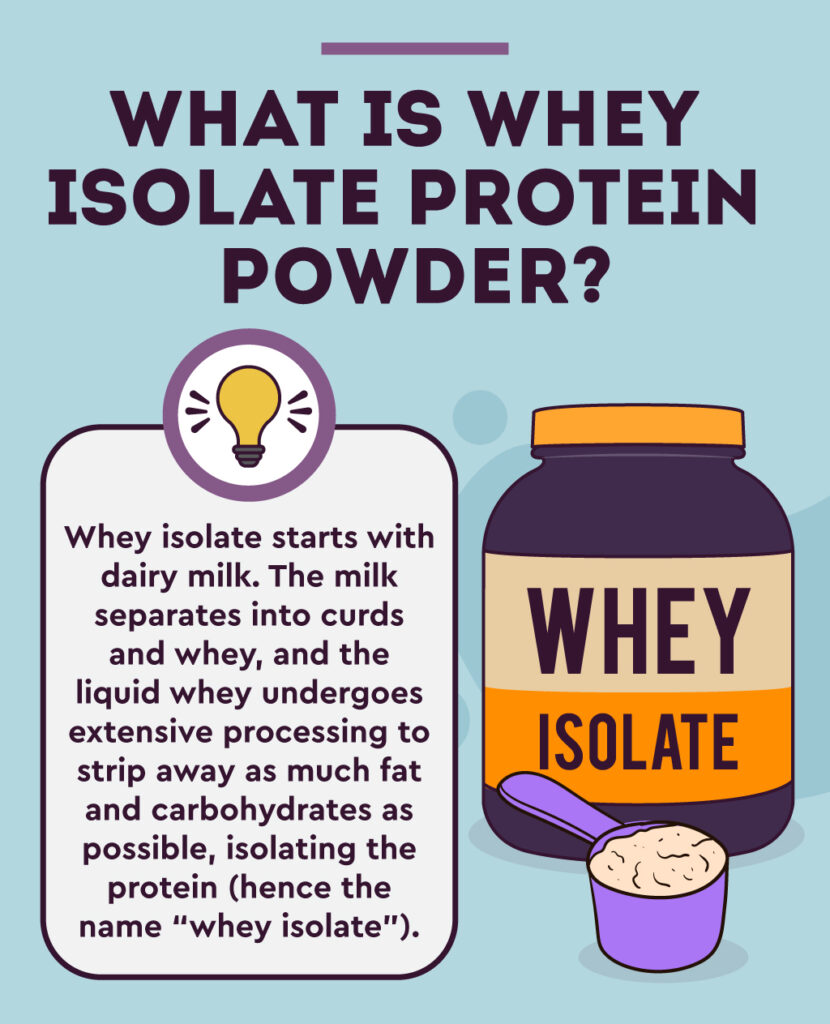
Whey isolate starts with dairy milk.
The milk separates into curds and whey, and the liquid whey undergoes extensive processing to strip away as much fat and carbohydrates as possible, isolating the protein (hence the name “whey isolate”).
The carbohydrates in milk are in the form of lactose, the naturally occurring sugar found in milk. Making whey isolate removes all (or nearly all) of this lactose, providing a lactose-free protein powder.
The result after processing is an almost pure protein powder (90-95% or more by weight).
According to the U.S. FDA (Food & Drug Administration), whey protein isolate (unflavored) has 24.5 grams of protein in a 27-gram scoop (91%) and only 100 calories.
However, some brands are even higher, like Transparent Labs’ Grass-Fed Whey Isolate with 93% protein (click here to read our review).
What Is Whey Concentrate Protein Powder?
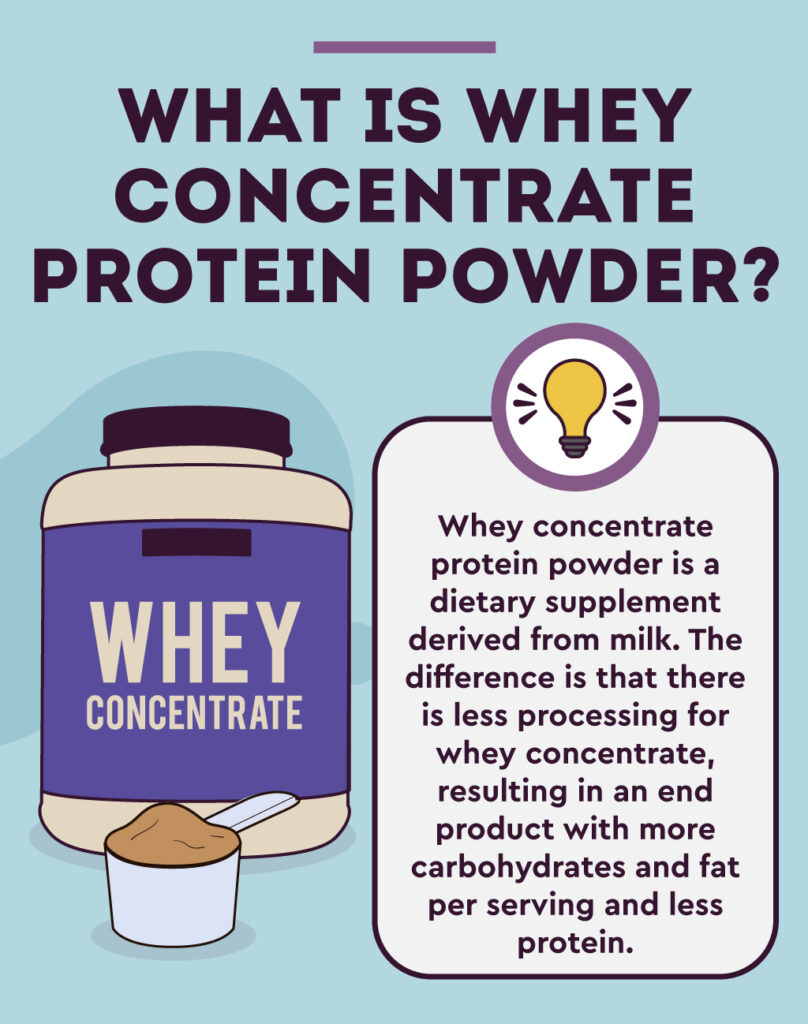
Like whey isolate, whey concentrate protein powder is a dietary supplement derived from milk. The difference is that there is less processing for whey concentrate, resulting in an end product with more carbohydrates and fat per serving and less protein.
There are minor differences from brand to brand, but an average serving of whey protein concentrate (unflavored) has 25 grams of protein in a 31-gram scoop (81%) and 130 calories.
Whey concentrate also contains an average of 2.5 grams of fat and 1 gram of carbohydrates, which means it will contain lactose.
However, you can also find whey concentrate with significantly less protein per serving because labeling rules allow a protein powder with just 25% protein content by weight to be called “concentrate.”
Therefore, a 30-gram scoop of whey protein concentrate could have as little as 7.5 grams of protein.
This is why it’s essential to read the nutrition label before purchasing your protein powder to ensure you get a high-protein product.
5 Differences: Whey Isolate vs. Whey Concentrate
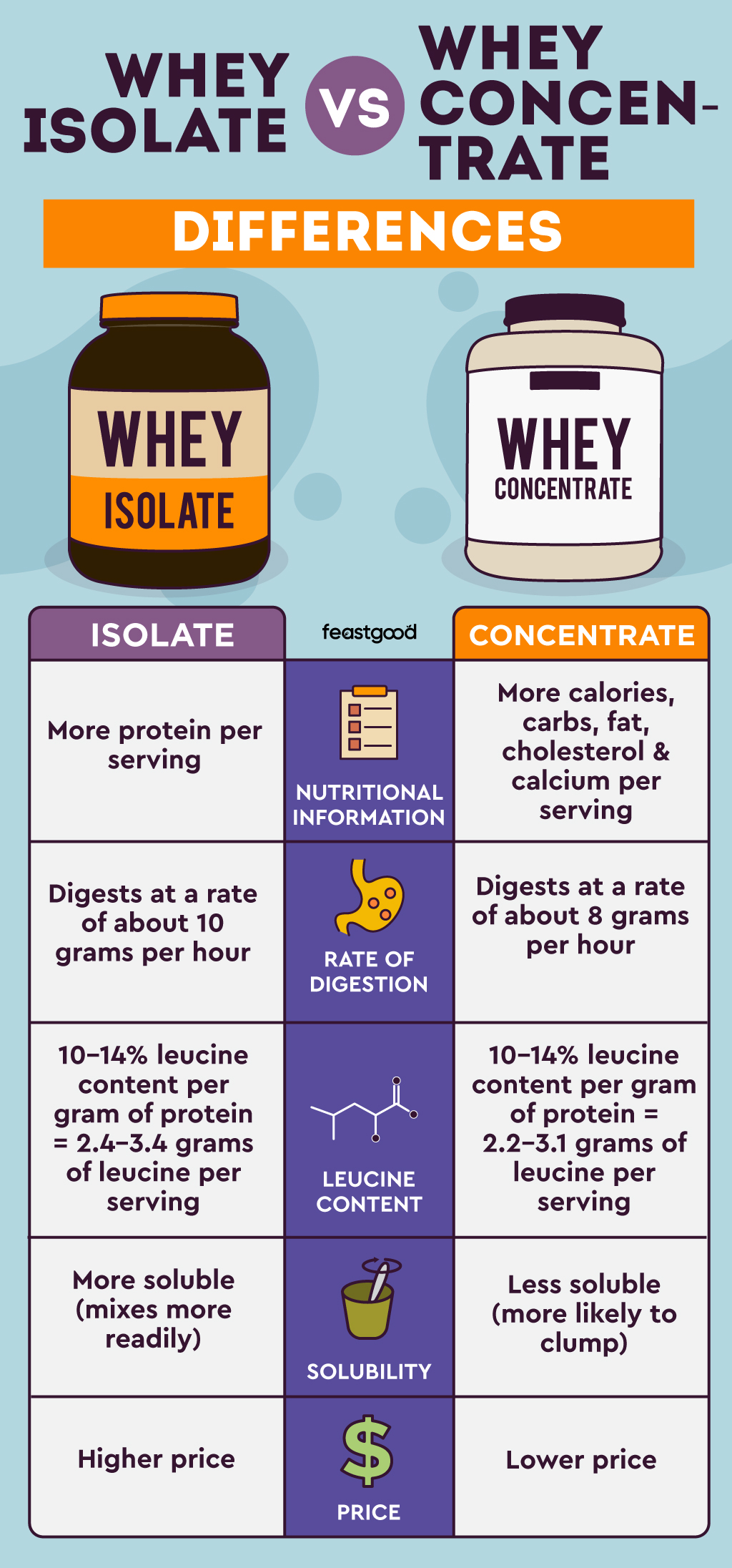
To help you decide which type of whey is best for you, let’s dive into the five key differences between the two types of whey protein powder.
1. Nutritional Information
The following information is based on 100-gram servings of whey protein isolate and concentrate.
| Nutrient (info per 100 grams) | Whey Protein Isolate | Whey Protein Concentrate* |
|---|---|---|
| Calories | 364 calories | 419 calories |
| Protein | 90.9 g (99% of calories) | 80.6 g (77% of calories) |
| Fat | 0 g | 8.1 g |
| Carbohydrates | 0 g | 3.2 g |
| Fiber | 0 g | 0 g |
| Sugars | 0 g | 3.2 g |
| Calcium | 91 mg | 548 mg |
| Iron | 0.91 mg | 0 mg |
| Sodium | 682 mg | 210 mg |
| Cholesterol | 0 mg | 226 mg |
As you can see, whey protein isolate provides more protein per serving than whey concentrate, whereas whey concentrate provides more calories, carbs, and fat.
Since whey concentrate contains more fat, it also contains more cholesterol, but on the brighter side, whey concentrate also has more calcium.
If you need to avoid lactose due to an allergy or intolerance, whey isolate is the “whey to go” (a little protein humor for you).
In either case, whey protein powder is a supplement and needs to be considered along with the macronutrients you get from your regular meals and snacks.
“While whole foods should form the basis of your diet, protein supplements can be a valuable tool for meeting your protein needs. Especially if you lead a busy lifestyle…It’s all about finding the right balance that works for your lifestyle and nutritional needs.”
– Marius Matulevicius, Online Personal Training Coach
The bottom line: Consider the calories and macros in a serving of whey protein powder in the context of your overall day and choose the one that provides the right balance of calories and macronutrients to help you hit your daily targets.
- Related: Whey Protein Foods – 10 Foods Naturally Rich In Whey Protein
2. Rate of Digestion
Whey protein isolate digests at about 10 grams per hour, meaning a 30-gram serving with 27 grams of protein would take just under 3 hours to absorb completely.
Whey protein concentrate digests at about 8 grams per hour, meaning a 30-gram serving with 24 grams of protein would also take about 3 hours to absorb completely. Still, you’d get three fewer grams of protein (a negligible difference).
These rates of digestion are based on these supplements by themselves; adding additional ingredients to your protein shake, meal, or snack will slow down the rates of digestion.
For preserving lean muscle mass, it can be helpful to choose a slower-digesting protein to provide a steady stream of amino acids (the building blocks of protein) during prolonged periods without food, such as overnight while sleeping.
On the other hand, it’s a good idea to prioritize fast-digesting protein before and after workouts to assist with “muscle protein synthesis” (building new muscle tissue).
That said, your total daily protein intake and the frequency of ingestion are most important when it comes to maximizing muscle growth and retention, so the rate of digestion should not be the determining factor when choosing between proteins.
The bottom line: Although there are differences in the rate of digestion of each type of protein, the rate of digestion doesn’t necessarily matter until you’ve mastered other aspects of your nutrition, so your decision should be based on other factors.
- Related Article: How Long Does Whey Protein Take To Digest + Why It Matters
3. Leucine Content
Leucine is an essential amino acid (EAA) in protein and is the limiting factor for muscle growth. So, the higher the leucine content, the better the quality of the protein.
Whey protein has 10-14% leucine content per gram of protein, regardless of whether it is whey protein isolate or whey protein concentrate.
The difference between the two is that whey protein isolate has more protein per serving and, therefore, more grams of leucine per serving.
The difference can be significant if you compare a whey protein concentrate with a low percentage of protein (25%) to a whey protein isolate.
However, the difference is negligible if it’s a high percentage of whey protein concentrate and a whey protein isolate:
| Whey Protein Isolate (90%) | Whey Protein Concentrate (80%) | Whey Protein Concentrate (25%) | |
|---|---|---|---|
| Leucine per 30-gram serving | 27 grams of protein = 2.7-3.8 grams of leucine | 24 grams of protein = 2.4-3.4 grams of leucine | 7.5 grams of protein = 0.8-1 gram of leucine |
The bottom line: Since the leucine content is almost identical between a high percentage whey concentrate (80% or more protein) and a whey isolate, either can work for muscle-building. Steer clear of low percentage whey protein concentrate unless you want to take multiple servings to match leucine content.
- Related: Whey Protein vs. Plant Protein for Fat Loss: Which Is Best?
4. Solubility
With minimal (or no) fat and carbs, whey protein isolate dissolves very easily in water, making it a great choice if you are dealing with a scoop of protein and a shaker cup at the gym after your workout.
The additional carbs and fat in whey protein concentrate reduce its mixability.
However, the carbs and fat can also contribute to a creamier, thicker protein shake once mixed, which might be more appealing to some people.
The bottom line: Whey protein isolate dissolves more readily than whey protein concentrate, and this will make a difference depending on how you’re making your shake (shaker cup vs. blender), what you’re mixing it with (water vs. other ingredients), and your personal preferences (thin or thick shake).
5. Price
Whey protein concentrate with 75-80% protein per serving is available for as low as $0.89 USD per serving if you are willing to buy in bulk for an unflavored product with no additional ingredients.
Watch out for brands of whey concentrate that are cheaper than this, as they are likely to contain minimal amounts of protein.
Whey protein isolate can cost more than double that, with prices as high as $2.00 USD per serving for premium brands. The average cost is $1.34 USD per serving, but some discount brands of whey isolate are available for as little as $1.17 USD per serving.
On average, whey protein isolate costs 30-50% more than whey protein isolate but often only provides 12-20% more protein per serving (compared to whey protein concentrate with 75-80% protein).
The bottom line: Unless you are lactose-intolerant, paying more for whey isolate may not be worth it compared to a high percentage of whey concentrate since the difference in grams of protein is so small. Check nutritional facts and ingredients, and pick third-party certified brands so that you can trust the labels.
How To Pick Between Whey Isolate vs. Whey Concentrate
To choose between whey isolate and whey concentrate, consider your primary goal and how you plan to use it.
If Your Goal Is Weight Loss: Pick Either Isolate or Concentrate
If your goal is weight loss, the type of protein you pick needs to help you achieve a calorie deficit (consume fewer calories than it takes to maintain weight) by hitting your calorie and macro targets.
Whey protein isolate has fewer grams of carbs and fat (and fewer calories) per serving than whey protein concentrate, so it is the best option if you struggle to meet your protein intake without exceeding your carb and fat targets.
However, suppose you struggle to stick to your calorie deficit because you’re hungry and having cravings. In that case, whey concentrate is a better choice because it’s slower rate of digestion can help you feel satiated.
If Your Goal Is Muscle Gain: Pick Either Isolate or Concentrate
If your goal is muscle gain, whey protein concentrate will provide you with more calories, carbs, and fat than whey isolate, which can help you achieve a calorie surplus.
But, if you’re already getting enough carbs and fat from your food sources, you can switch to a whey protein isolate to help you reach your protein target without adding too many additional calories (leading to excess fat gain).
If You Want To Reduce Stomach Discomfort: Pick Whey Isolate
If your goal is to reduce stomach discomfort, you need to figure out if you are lactose intolerant or if other ingredients in your protein powder are making you uncomfortable.
If you are lactose intolerant, choose a lactose-free whey protein isolate over a whey protein concentrate.
If you are sensitive to other ingredients, then it may not be a matter of whey isolate versus concentrate but instead finding a protein powder that does not contain ingredients that don’t agree with you.
For example, some brands or flavors of protein powder have sugar alcohols that can cause digestive distress for sensitive individuals (such as people with IBS).
Some protein powders contain thickening agents like xanthan gum or carrageenan, which can also lead to bloating.
Try samples of different types and brands of protein to see what you can tolerate and what causes symptoms.
If You Are Mixing With Just Water: Pick Whey Isolate
As I said in the section on solubility, whey protein isolate will dissolve better if you use a shaker cup and some water to mix your shake.
But if you can access a blender, you can get a delicious creamy protein smoothie with whey protein concentrate.
If You Are Cooking With Whey Protein: Pick Concentrate
If you plan to cook or bake with protein powder, whey concentrate usually results in a better final texture because whey isolate tends to dry out baked goods.
If you’re still unsure which type of protein you’d prefer, order sample packs of each one and try them out to see what you like best.
Whey Protein Isolate: Recommendation
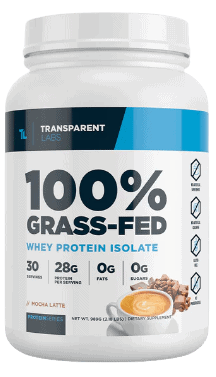
My number one recommendation for whey protein isolate is Transparent Labs 100% Grass-Fed Whey Protein Isolate Powder. I love that this brand is third-party certified, so you can trust the label to match the contents. Check out our full review here.
Whey Protein Concentrate: Recommendation
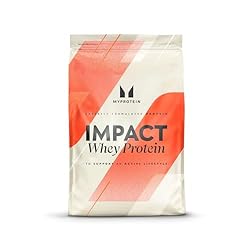
My top recommendation for whey protein concentrate is MyProtein Impact Whey Concentrate. Like Transparent Labs, this brand is also third-party certified, and there are 17 flavors (including unflavored, if you prefer) at a very competitive price.
Frequently Asked Questions
Is Whey Isolate The Best Protein?
Whey protein isolate is considered the “best” protein based on its leucine content and Protein Digestibility Corrected Amino Acid Score. But the best protein depends on your goals, preferences, and budget.
Are There Any Potential Allergens In Whey Protein Isolate Or Whey Protein Concentrate?
Yes, there are potential allergens in both whey protein isolate and concentrate. Whey protein concentrate contains lactose, and even whey protein isolate may contain trace amounts (look for a 100% lactose-free brand if needed). Neither type is appropriate for someone who is allergic to dairy protein.
Which Tastes Better: Whey Protein Isolate Or Whey Protein Concentrate?
The best-tasting protein powder is a matter of personal preference, depending on the type, brand, and flavor. I recommend trying a sample size of several different types, brands, and flavors of other protein powders to find out what suits you best.
Can I Use Whey Protein Isolate & Whey Protein Concentrate Interchangeably In Recipes?
No, you cannot use whey protein isolate & whey protein concentrate interchangeably in recipes. Whey protein isolate absorbs more liquid per serving, resulting in a drier texture, whereas the fat and carbs in whey protein concentrate can impact the recipe results. Look for recipes that have specific instructions.
Can I Get All My Protein From Whey Protein Isolate Or Whey Protein Concentrate?
While you technically could get all your protein for the day from whey isolate or whey concentrate, this would not be optimal for your health as you would lack essential micronutrients.
Instead, include a variety of whole-food protein sources and use protein powder as needed to meet your overall targets.
Can I Use Both Whey Protein Isolate And Whey Protein Concentrate At The Same Time?
Yes, you can use whey protein isolate and concentrate simultaneously. You might choose to have whey protein isolate immediately after your workouts and use whey concentrate at other times of the day, such as in recipes or before bed. Mix these protein powders together to reduce the overall cost per serving.
Check Out Our Other Protein Comparisons
- Pea vs Whey Protein
- Grass-Fed Whey vs Regular
- Protein vs Amino Acids
- Protein Powder vs Pre-Made Shake
- Hemp vs Whey Protein
- Whey vs Egg Protein
References
Wilt TJ, Shaukat A, Shamliyan T, et al. Lactose Intolerance and Health. Rockville (MD): Agency for Healthcare Research and Quality (US); 2010 Feb. (Evidence Reports/Technology Assessments, No. 192.) 3, Results. Available from: https://www.ncbi.nlm.nih.gov/books/NBK44624/
Schoenfeld, B.J., Aragon, A.A. How much protein can the body use in a single meal for muscle-building? Implications for daily protein distribution. J Int Soc Sports Nutr 15, 10 (2018). https://doi.org/10.1186/s12970-018-0215-1
About The Author

Lauren Graham is a Precision Nutrition Level 1 certified nutrition coach. She focuses on helping busy professionals balance healthy eating and purposeful movement. Lauren has a background in competitive swimming and is currently competing as a CrossFit athlete. She has a passion for training, teaching, and writing.
Why Trust Our Content

On Staff at FeastGood.com, we have Registered Dietitians, coaches with PhDs in Human Nutrition, and internationally ranked athletes who contribute to our editorial process. This includes research, writing, editing, fact-checking, and product testing/reviews. At a bare minimum, all authors must be certified nutrition coaches by either the National Academy of Sports Medicine, International Sport Sciences Association, or Precision Nutrition. Learn more about our team here.
Have a Question?
If you have any questions or feedback about what you’ve read, you can reach out to us at [email protected]. We respond to every email within 1 business day.
